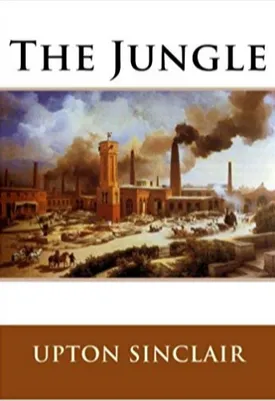Upton Sinclair
Upton Sinclair was an American author and activist, whose career spanned over the course of nearly sixty years from 1878 to 1968. During his lifetime Sinclair wrote nearly ninety books and short stories, as well as winning the Pulitzer Prize in 1943 for his novel Dragon’s Teeth. He was an advocate for social justice, standing firmly against the mistreatment of workers and the suffering of the poor in big cities. His works were focused on inspiring the public to take action and protest against the injustices of the capitalist system.
Sinclair was born on 20 September 1878 in Baltimore, Maryland. His parents were Ladislaus Henry Sinclair and Priscilla Harden. He was the oldest of five siblings and was raised in a devoutly religious family. His father's readings of books such as David Copperfield and The Pilgrim’s Progress inspired Sinclair to write at an early age. His first published work was a poem written at the age of fourteen and published in a local Baltimore newspaper.
In 1897, Sinclair moved to New York City to continue his studies in English and literature at Columbia University. At this time, he was already writing novels and stories, occasionally gaining attention from publishers. However, it was not until 1906 that his first novel, Springtime and Harvest was published and received widespread critical acclaim. This was followed by King Coal in 1917, which brought him fame and became the first book of a trilogy relating working class life in the United States.
Sinclair wrote his most famous novel, The Jungle, in 1906. This story depicted the harsh conditions in the U.S. meatpacking industry and their effects on the workers, and made a deep impression on the minds of readers, who at the time were not aware of the working conditions in factories. As a result of The Jungle’s success, workers’ rights legislation was introduced in the U.S., and Sinclair has often been referred to as being one of the founders of the prevention of workplace exploitation.
In 1933, Sinclair was the Democratic nominee for Governor of California as part of his campaign for socialism, however he was defeated at the polls. Despite this, his career progressed and he and his wife moved to Monrovia, California where he wrote his most important works and established The Fellowship of Freedom in 1938, which was a institution created to support socialist publications and authors.
Sinclair was an outspoken critic of militarism and war and the negative affects it had on the working class. During World War II he wrote novels such as The Prodigal Parents, and The Flivver King which was about the injustices of big business and labor theory. He also wrote about the philosophical implications of taxation, economic policy, and civil liberties. All of Sinclair's works were written in a way that encouraged readers to question social and economic systems and to take a stand against government corruption.
Sinclair was also involved in journalism and radio. He wrote several leading op-eds for the New York Call, which was an early radical newspaper, and hosted the radio show Upton Sinclair, In the Memory of 30,000 on WPAQ. With this show, Sinclair spoke directly to the people and provided news, commentary, and analysis on the events of his time, to create a greater sense of social awareness.
Sinclair’s life was full of accomplishments. His commitment to progressive and socialist causes earned him a place in history. His works are still read and discussed today and he is recognized as a pioneering figure in progressive thought. He died in 1968 at the age of 90 in Bound Brook, New Jersey, however his legacy and impact live on to this day.

